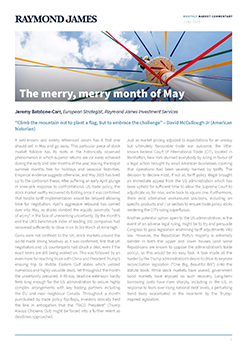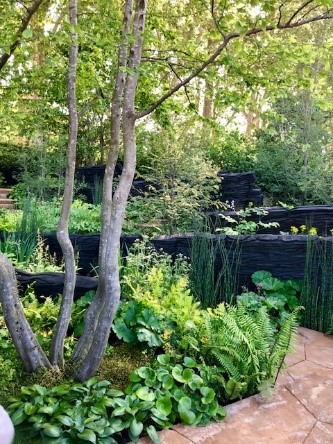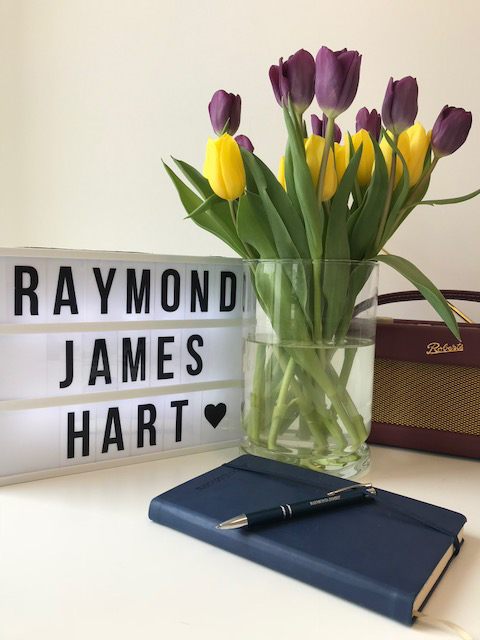With the effects of the tariffs announced by Donald Trump in the White House Rose Garden still to play out, Raymond James European Strategist, Jeremy Batstone-Carr, considers some of the potential effects on the global economy.
10 steps to 2021
10 Steps to 2021
The festive season is upon us and with it comes the end of 2020. This has been a long and challenging year and while our holiday celebrations may look a little different, it’s a unique opportunity to stop, take stock and then look to the New Year as more than just a countdown, but a new beginning.
Follow our 10 steps to help reflect and guide you into 2021:
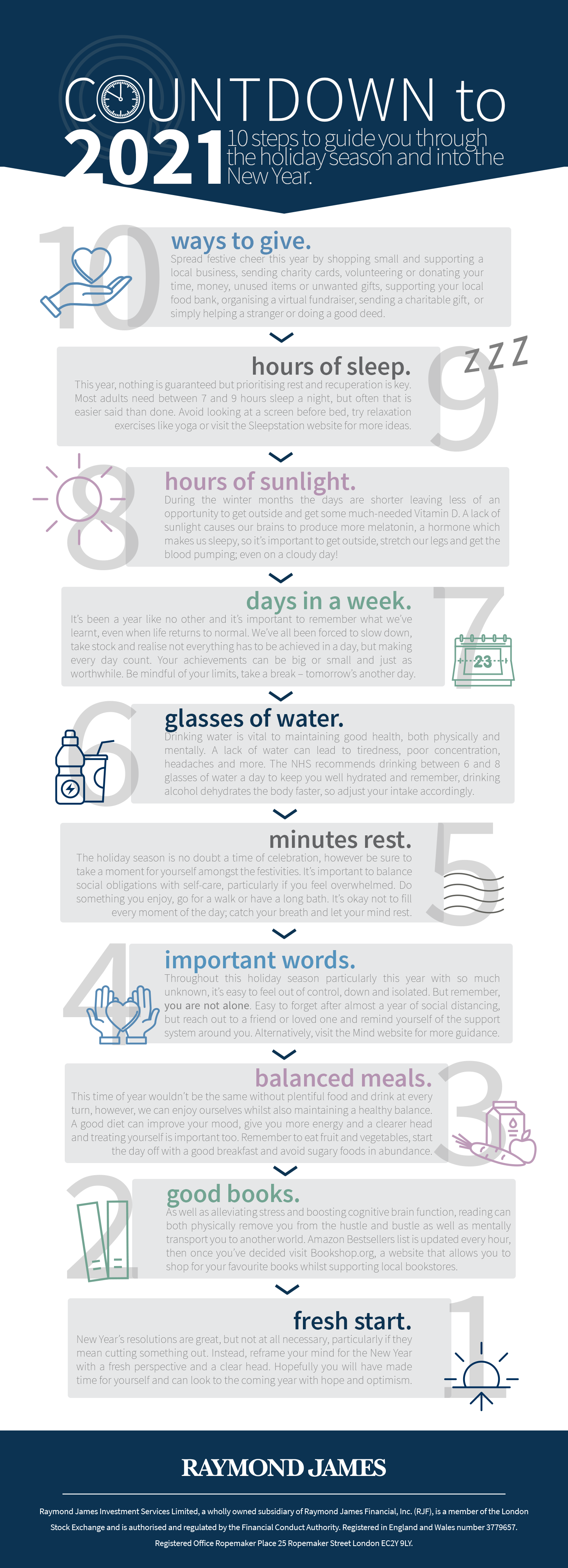
Six things to know to weather a market downturn
It can be unsettling for investors when their portfolios and the markets start heading into the red. Here are six investing basics to keep in mind during volatile times.
PERIODS OF VOLATILITY ARE NORMAL
All markets move in cycles, and periods of steep contraction are completely normal. While the length of market contractions varies, periods of growth and expansion are usually waiting on the other side. The markets have proven remarkably resilient over the long term, and while returns can be quite volatile year-to-year, they’re generally positive over multi-year periods.
DON’T PANIC
Letting emotions dictate your investing strategy is a risk you shouldn’t take. Short-term decisions can have long-term consequences on your portfolio. Being patient can pay dividends.
KNOW YOUR PORTFOLIO
Understand your investments and how specific assets represent different goals and outcomes. Keep in mind your risk tolerance and investment timeline, and if either has changed, consider talking to your wealth manager about rebalancing your portfolio. Diversification can potentially help balance risk during a downturn and mitigate extreme swings in value.
STAY THE COURSE
Remember your financial plan and long-term goals and stick to them. A disciplined investment approach is a sound strategy for handling market downturns and will likely enable you to participate when the markets rebound.
CONSIDER OPPORTUNITIES
Working with your wealth manager, determine whether periods of volatility are a good time to take advantage of investment opportunities in line with your long-term plan.
YOU’RE NOT ALONE
Your wealth manager is available to help you when you need it. He or she can guide you through difficult markets and be the independent voice that helps you stay focused on your long-term goals.
Investing involves risk and investors may incur a profit or a loss. Past performance may not be indicative of future results. Diversification does not ensure a profit or protect against a loss. This information does not constitute advice or a recommendation and you should not make any investment decisions on the basis of it.
Easy Ways to Add a Little More Joy to Your Day
Add a small splash of happiness to your regular routine with these suggestions.
Start your day off on the right foot
Have something to look forward to. This can be anything, from lunch plans with a friend to your favourite cup of coffee.
Cross a dreaded task off your to-do list. The earlier you do it, the better, as your willpower is at its strongest in the morning.
Feel a sense of purpose. Think about how your day-to-day work impacts the lives of others. Ask yourself, “How is the work I’m doing helping someone down the road? What meaning can I find here?”
Say thank you. Help others feel appreciated and boost your own mood by actively practicing gratitude.
Kiss (or hug) someone you love. Psychologists believe that starting the day with affection can help foster a positive attitude and, in turn, a healthier lifestyle. What’s more, a 10-year psychological study concluded that men who kiss their wives before work live five years longer, make 20-30% more money and are 50% less likely to get in a car accident.
End your evening on a good note
Let go of work. Make a to-do list for the next day and include notes on how you’ll tackle each task. Once done, make sure to disconnect.
Turn your Tuesdays into Saturdays. Studies show what we most treasure about weekends is extra time with those we love, so schedule weeknight plans with family or friends.
Practice. Instead of spending your evening watching TV, a habit that’s been linked to lower life satisfaction, try practicing something you enjoy, such as knitting, creative writing or Sudoku.
Remember the good. Write down at least three good things that happened during the day, including why they were good.
Dim the lights. Ease into a good night’s sleep by turning off your smartphone and computer screens an hour before bedtime. Using a smartphone for 10 minutes is the equivalent of spending an hour in bright daylight.
Don’t go to bed angry. Instead, aim to go to bed feeling grateful.
Sources: bakadesuyo.com; Time magazine; Journal of Personality and Social Psychology
Planting an Investment Portfolio
This week I attended the RHS Chelsea Flower Show, and while I was enjoying the gardens and floral displays it occurred to me that gardening and investment management have more in common than you might think.
Chatting with some of the designers, we were discussing how important it is for them to get to know the client, and understand what the space will be used for. How long are they expecting to stay in the house, how much time do they have to spend on maintenance, what are the growing conditions, is it sunny or shaded, wet or dry? What type of soil, is it acid or alkaline? What sort of budget is there to spend on new plants or do you have to work with what you’ve got?
Your savings and investments are no different. Before doing anything you need a plan! Why are you investing? What is on the horizon? Buying a house, school fees, childrens’ weddings, retirement, security in old age? How long do you have to achieve this and how much money do you have now? What can you expect to save or invest along the way? Are you comfortable with risk or risk averse? Do you have the knowledge, time and experience to do this yourself or would you be happier to appoint a professional to really get to know you, understand what you’d like to achieve and look after things for you?
However in both cases there are things that can derail the best laid plans.
Weather and garden pests are probably the most likely candidates to thwart your horticultural dreams. Too much rain or not enough, slugs and snails; there are everyday hiccups that we can intervene in and most plants will recover. Even if something dies there should be others to take its place but occasionally something sudden and unexpected makes a drastic change; a storm blows right through the garden knocking down trees and fences or a late frost takes its toll on early spring blooms. At that point it might be necessary to take stock and reflect on what has happened, but it is unlikely to change your longer-term plans for the space, and what you want to achieve in it. Such events seem a world away from investment but there are similarities
There are every day wobbles in individual investments; perhaps unseasonal weather has affected a business’s trading figures and given time this may correct itself. Perhaps the business has made fundamental strategic errors and it becomes clear that this is a longer-term problem and the investment does not flourish, but this is isolated to one of your holdings. Then again occasionally there can be sizable shocks like the banking crisis, or the current uncertainty surrounding BREXIT or the potential US/China trade wars. It can feel like a huge storm engulfing all aspects of the business world, the whole economy is affected and everyone feels the effects. If you have planned your portfolio properly you may step back to reflect, and assess things, but it is unlikely that you will need to panic or make big changes; your long-term goals are unlikely to be altered by events in the market.
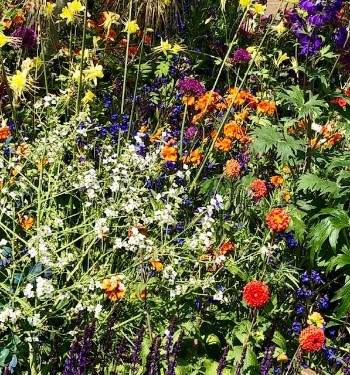
Back in the garden careful planning, an eye on the weather forecast and growing the right plant in the right conditions will hopefully minimise the impact of any plant that doesn’t prosper! Gardeners mix their plants, making sure they have a mix of plants that are at their best at different times of the seasons for best effect, they keep the weeds down, and prune overgrown shrubs even forgoing a flowering season for a healthier plant in the future, although the flowers are lovely.
Portfolios are no different – they need monitoring, tidying up from time to time and if a holding gets too big because it’s successful it should be pruned, perhaps at the expense of some capital gains tax, even if the dividends are wonderful! That way you’ll be able to spread your investments and any passing storm is less likely to blow the whole thing over!
Garde ning has been much commented on recently as an antidote to the stressful lives we are all leading at the moment, sometimes one can focus too much on the short term movements of stock markets, so perhaps then the best thing to do might be to take a mindful wander around a lovely planted space, prune the roses or even just cut the grass!
ning has been much commented on recently as an antidote to the stressful lives we are all leading at the moment, sometimes one can focus too much on the short term movements of stock markets, so perhaps then the best thing to do might be to take a mindful wander around a lovely planted space, prune the roses or even just cut the grass!
If you would like a cup of tea and a chat about your investments perhaps to discuss your objectives or revisit them to check your strategy, please do get in touch, I’m happy to chat about your garden too, although I can’t promise any gardening assistance – I have plenty of work to do in my own!
Home is where the Hart is!
No, it’s not a typo! Hart District Council is well located in the north east corner of Hampshire and takes its name from the River Hart which flows through its centre. It is easy to get to, being just off the M3, just about half way between London and the south coast and enjoys fast train services from London Waterloo to Fleet. I have lived in Church Crookham, within Hart for 20 years now.
It is a semi-rural location, surrounded by beautiful Hampshire villages and countryside, we have the Basingstoke Canal close by, together with Fleet Ponds, Hartley Wintney with its pub overlooking the traditional cricket pitch, Odiham and RAF Odiham, a front line support helicopter base and home to three squadrons of Chinooks which are a familiar sight and sound as they fly overhead. There are numerous other smaller country parks and green spaces.

